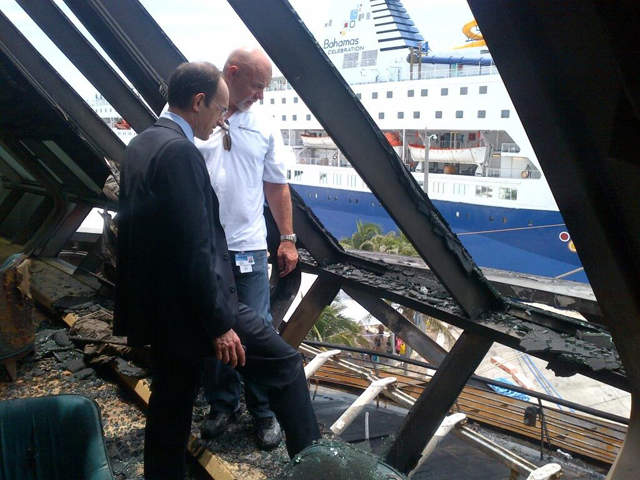
(CNN) -- Another cruise ship, another fire. And for thousands of passengers, another vacation cut short.
More bad news for a cruise company? Maybe not. Less than an hour after a Memorial Day fire aboard Royal Caribbean's Grandeur of the Seas was extinguished, company officials started tweeting out details.
The fire forced the cancellation of the rest of a seven-day cruise to Port Canaveral, Florida; CocoCay and Nassau, in the Bahamas. The ship changed course and sailed under its own power to Freeport in the Bahamas, arriving about 10 a.m. the same day.
Days after the Cruise Line Industry Association announced its Passenger Bill of Rights, Royal Caribbean had the opportunity to put it to the test.
The ship had been docked just six hours when Royal Caribbean tweeted that passengers would receive full refunds of the fare paid and a certificate valued at the May 24 fare for a future sailing. The bill of rights requires only partial refunds for voyages that are terminated early because of mechanical failures.
Another promise of the 10-point bill of rights is transportation to the scheduled port of disembarkation or passenger's home city in the event of a terminated cruise. The cruise line has taken care of flights and said it was looking into transportation via boat, bus and train for passengers who didn't want to fly back to the departure point of Baltimore, the company announced via Twitter.
In an age when nearly everyone has a smartphone to record incidents as they are occurring, cruise lines should be prepared for passengers to share what happens aboard ship. "If you have any kind of problem, don't think it's not going to find its way into the mainstream press," said Carolyn Spencer Brown.
"Nothing says a cruise line has to break the information on Twitter," the way Royal Caribbean is doing, Spencer Brown said. "Those are impressive photos they're tweeting out. Yes, they have the happy picture with passengers. But they also tweeted out (a picture of) Deck 6 that was charred and burned. I love the transparency. "
Spencer Brown says the company's strategy appears to be working.
"Passengers are already saying (publicly) that they felt comforted and confident about their safety during this trying episode," she said. "Doing the right thing is the best way to control what people say about you. Since you know the information is going to come out, be transparent and get ahead of the story."
Lessons were probably learned from Carnival Cruise Line's handling of recent problems aboard the Carnival Triumph and Dream and the capsizing of the Costa Cruises Concordia. (Carnival Corp. owns Carnival Cruise Lines and Costa Cruises.)
Politicians and passengers criticized Carnival's public response. And in March, U.S. Sen. Jay Rockefeller asked that the company repay the government for at least $4.2 million for the U.S. Coast Guard and U.S. Navy costs associated with two Carnival incidents. In April, Carnival announced that it would "voluntarily" reimburse the U.S. Treasury but didn't name a dollar amount.
The bad publicity is what led to the industry's announcement, says maritime lawyer Robert Peltz.
"I believe the cruise line industry bill of rights is window dressing designed to distract attention from the Carnival Triumph, Carnival Splendor and the Costa Concordia incidents," Peltz said.
Missing from the bill of rights?
Royal Caribbean tends to respond to its passengers' concerns, says Peltz, but he would like to see stronger industry-wide provisions protecting passengers in the event of injury or death aboard ship or on third-party or cruise company shore excursions. The current bill of rights doesn't mention those issues.
The cruise association's new passenger bill of rights, announced May 22, applies to 26 North American member cruise lines and applies to cruises purchased in North America on those lines, regardless of itinerary. The association plans to request global recognition of the new policy from the International Maritime Organization.
CNN.com commenter Graeme McIntosh, who says he has sailed on 15 cruises throughout the Caribbean, Alaska, South America and the East Coast and has never experienced an incident, agreed that the bill of rights is "a damage control measure drafted by the industry."
McIntosh, a fire and safety consultant in Toronto, would like to see crew and passengers required to take muster drills more seriously (no drinking or partying for passengers) and require surprise drills that take into account how passengers would respond to locked doors and blocked stairwells.
He applauded passengers using smartphones to capture events as they happen. "They can assist investigators with establishing a time line of events and show the actions of occupants and crew during a real situation."
Cruising enthusiast and CNN.commenter Aubrey Pruis isn't cynical about the industry's move to adopt a bill of rights.
"Yes, the cruise lines are hard at work protecting/salvaging their public image in the face of tragedy, but on the same note, cruise lines do seem to take tragic matters seriously as demonstrated in how they take immediate action to remedy any given situation."
"I do think this will have a positive impact on the cruise industry and the public will continue to take cruises," he wrote via e-mail. "I know I will."
By Katia Hetter, CNN
For more cruise news & articles go to http://www.cruisecrazies.com/index.html
Re-posted on CruiseCrazies.com - Cruise News, Articles, Forums, Packing List, Ship Tracker, and more












Recommended Comments
Join the conversation
You can post now and register later. If you have an account, sign in now to post with your account.